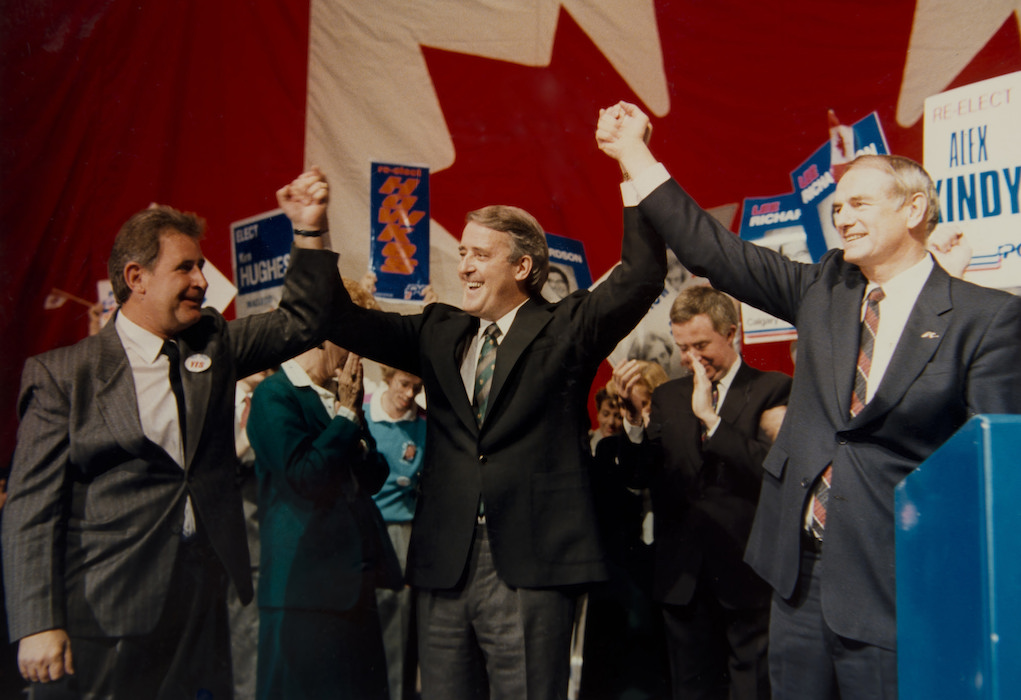Circa 1986, I recognized Simon Reisman one afternoon on a street in Toronto, just across Bloor Street from the Royal Ontario Museum.
Reisman was the former senior civil servant who acted as chief negotiator for the Canadian side in the talks that would result in the so-called Canada-U.S. Free Trade Agreement. Those negotiations were initiated by Progressive Conservative prime minister Brian Mulroney, the well-known Irish baritone who has been so hard at work lately trying to polish up his tarnished reputation.
Pretty boldly for a lad of 34, I stopped Reisman, introduced myself and expressed my skepticism about the still-uncompleted treaty, which was highly controversial at the time.
Whatever the American negotiating team made of him, I was no match for Reisman’s blarney skills. I still remember his answer quite clearly, although I can’t guarantee my transcription’s accuracy is quite up to Postmedia standards of stenography, what with more than 30 years having passed and everything.
At any rate, he told me, “Free trade is gonna be great! Canadians are gonna make so much money they’re not gonna know what to do with it all!”
But, I asked, what if some crackpot ends up running the United States and tears up the deal after we’ve integrated our economy into theirs? (There was nothing particularly original about this thought at the time. Lots of people raised it as a concern. And I’ve probably edited my paraphrase of my own words with the benefit of hindsight. Readers will just have to forgive me.)
I can’t recall Reisman’s exact words as clearly, but the general theme of his riposte was as follows: “Oh pish-posh. It’ll never happen…”
Well, and this is the point in this long exercise in name dropping, here we are 30 years after the deal was done — the anniversary of the signing by Mulroney and U.S. president Ronald Reagan was Jan. 2 this year — and, lo and behold, a crackpot resides in the White House, just as prophesied. Our Canadian economy, which was never in danger of not trading with the United States, is so closely integrated into our neighbour’s it is impossible to contemplate setting back the clock. NAFTA, the successor to CUSFTA, is in grave danger, and fear stalks the land.
Maybe, just maybe, we should have listened to John Turner, Liberal leader in the 1988 federal election, and Ed Broadbent, the leader of the NDP, both of whom warned against the deal. Turner, indeed, accused Mulroney of “selling out Canada.”
In a typical Canadian outcome, a majority of Canadians voted for the parties that opposed the deal, but Mulroney’s Conservatives won a big majority, and the deal was done. It was the last time, significantly, a Progressive Conservative government would ever be elected in Canada.
Unceasing propaganda ever since has painted “free trade” with the United States as a huge success. “The overall benefits to Canada are manifest, although the initial costs for some sectors and some regions was (sic) heavy,” wrote lobbyist and former NDP national director Robin Sears in October 2012, at the same time as he was working as a lobbyist rehabilitating Mulroney’s reputation.
If one raised the issue of the human toll of those “initial costs,” the answer was, as often as not, that things would have been even worse without the FTA, a dubious proposition but a difficult one to refute, as it involved describing events that never took place.
This propaganda has been relentless, which makes Thomas Walkom’s column in the Toronto Star Monday all the more remarkable for telling the unblinkered truth about Mulroney’s free trade deal.
“There’s one upside to Donald Trump’s use of bully-boy tactics against Canada,” Walkom wrote. “They may force us to rethink our failed trade strategy with the U.S.”
He argues that our efforts to integrate our economy seamlessly into that of the United States got us into the doomed Afghan war, subjected Canadian citizens to grave human rights violations, and laid waste to our manufacturing sector.
Walkom continued: “The assumption behind this drastic restructuring of Canada’s political economy was that America would keep its word — that it would grant special status to Canada.”
Alas, Trump, who never keeps his word, has changed all that. We are in a far worse position that we would have been without CUSFTA and NAFTA. This is a courageous argument for Walkom to make in the face of 30 years of relentless propaganda, which through tireless repetition has taken on the air of unassailable truth.
As for Reisman, he was around to watch good Canadian industrialized jobs disappear into the United States with, to borrow a phrase from U.S. Reform Party presidential candidate Ross Perot, “a giant sucking sound going south.”
But I expect he would have viewed that with his characteristic optimism and argued it was all just a period of adjustment and things were bound to get better and better later. God knows, the man had chutzpah.
Neoliberals aren’t so cheerfully optimistic about the outcome when they administer bad economic medicine nowadays. Their tone has changed: “It always tastes bad. Now shut up and swallow.” It’s no longer our business to ask whether or not it’s good for us.
Reisman, at least, had the good fortune not to be around to witness the presidency of Donald Trump. He died a decade ago last Friday. The anniversary appears to have passed unremarked by Canadian media, notwithstanding the current trade contretemps with Trump the United States of Chaos.
Reisman talked on so long, and so enthusiastically, that day in Toronto, that eventually I made my excuses and went on my way.
He gave me his business card, which I have to this day. I’ll give the man this much, he clearly believed in his task.
God only knows what we’re going to do about his legacy now.
This post also appeared on David Climenhaga’s blog, AlbertaPolitics.ca.
Photo: Government of Alberta/flickr




